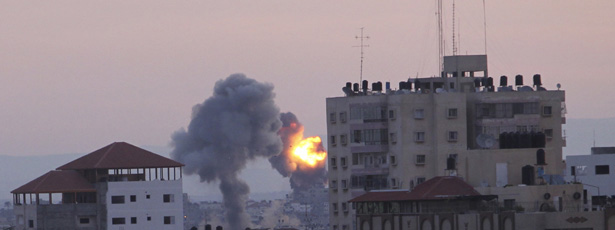Conflict in Gaza: The Egyptian President Plots a Dangerous Course
Morsi is dispatching some of his country's top leaders to a war zone -- and risking, or maybe courting, a regional crisis.

Despite his well-documented antipathy for Israel and affinity for Hamas, Egyptian President Mohamed Morsi is somewhat constrained in terms of how he can respond to the ongoing fighting in Gaza. Egypt's military has made it clear that it refuses to get involved, and the Muslim Brotherhood -- which is Hamas's Egyptian cousin -- appears disinclined from engaging Israel violently. So in the past two days, Morsi has crafted an impressively creative, not to mention devious, strategy: sending Egyptian emissaries to Gaza to effectively serve as human shields, which limits Israel's freedom of action against Hamas while simultaneously giving Hamas more cover to intensify its own attacks against Israel.
In this vein, when Egyptian Prime Minister Hesham Kandil visited Gaza today at Morsi's request, Israel agreed that it would halt its fire. But Hamas used the visit as cover for launching 50 additional rockets into Israel, including attacks targeting Jerusalem.
It should be a sign of things to come. Indeed, Kandil's visit has encouraged other Egyptian politicians and organizations to send delegations to Gaza, including former presidential candidate (and former MB leader) Abdel Monem Abouel Fotouh, the doctors syndicate, the engineers syndicate, and the Salafist Nour Party, while the MB has said that it is prepared to send its youth cadres. Earlier this afternoon, a coalition of political parties met with the MB and announced its intention to send a parliamentary delegation to Gaza in the very near future.
The fact that these visits will encourage Hamas to intensify its fighting, rather than encouraging it to move towards a ceasefire, is perhaps the most obvious risk. But the bigger risk of Morsi's strategy is that an Egyptian might be killed in the crossfire while visiting Gaza. And if that happens, Morsi will almost certainly use the resulting popular outrage as an excuse for expelling Israel's ambassador to Egypt and perhaps unilaterally amend, if not break, the peace treaty.
For this reason, Washington must send Morsi a message - now - that by effectively encouraging Egyptians to cross into a war zone, he is putting his own citizens at risk. Moreover, Morsi must be told that if something happens to the Egyptians visiting Gaza, the international community will not accept him using this as an excuse for revising Egypt's commitments.
To be sure, it was always expected that renewed fighting in Gaza would endanger Israel's relations with post-revolutionary Egypt. Given the hundreds of rocket attacks that Israel endured during the past year, Jerusalem apparently decided that this risk was worth it. But as a result of Morsi's actions, Egyptian-Israeli relations are now a heartbeat away from being broken.